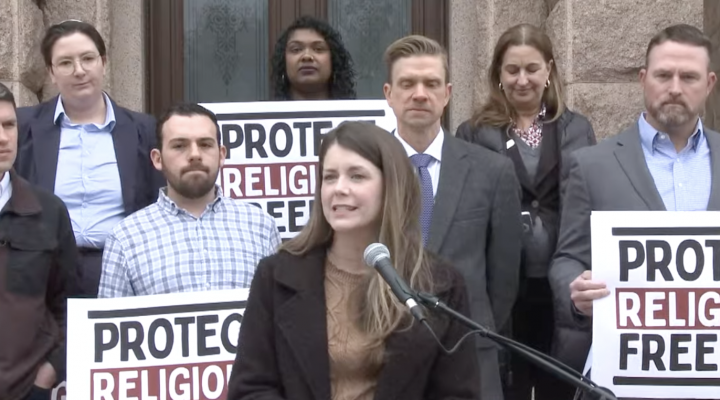The biggest school districts in Texas have voted against allowing unlicensed Christian chaplains to replace professional school counselors and to evangelize students at will, leaders of a six-month, faith-based campaign against the policy announced Feb. 29.
Groups including Baptist Joint Committee for Religious Liberty, Fellowship Southwest and the Anti-Defamation League launched their movement soon after the 2023 passage of Senate Bill 763, which granted school systems the right to use hired or volunteer chaplains as long as school boards voted by March 1 to participate.
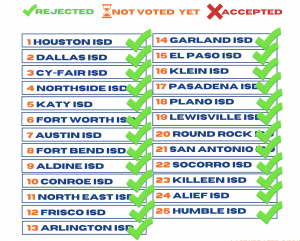 “We are pleased to report that Texas public schools are still safe for every faith. From our members, we know that the largest 25 school districts in Texas have all rejected creating a new chaplain program,” said Joshua Houston, advocacy director for Texas Impact, a nonprofit organization that equips faith communities to advocate for justice.
“We are pleased to report that Texas public schools are still safe for every faith. From our members, we know that the largest 25 school districts in Texas have all rejected creating a new chaplain program,” said Joshua Houston, advocacy director for Texas Impact, a nonprofit organization that equips faith communities to advocate for justice.
Among the largest districts opting out of the program are Houston Independent School District, Dallas ISD, Aldine ISD, El Paso ISD and Humble ISD.
The largest 25 districts “account for one in three of all school children in Texas. So, 1.8 million out of about five and a half million children go to a school in one of those districts,” Houston said during the conference livestreamed from the steps of the Texas State Capitol in Austin.
The rejection also transcended partisan divides, he said. “These districts are politically diverse. They include places like Austin, but they also include places like Katy ISD, Conroe, Frisco, Plano and North East ISD in San Antonio. That’s why we say we’re confident that Texas public schools are still safe for every faith.”
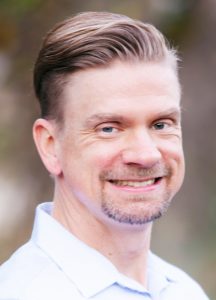
Josh Houston
Organizers said they did not have a tally for the voting among smaller districts yet but are optimistic many of those systems voted against bringing untrained chaplains into their schools. There is no statewide reporting mechanism to track how school boards have voted, just as there is no punishment prescribed for school boards that don’t make a choice.
“Today, we’re here to say we’re ‘25 for 25’ because that’s what we can say with certainty on this very last day for school boards to vote,” Houston said. “However, we’re very confident these numbers are much higher and just as overwhelming because of the reports coming in from our members.”
One system outside the top 25 that has opted not to use untrained chaplains is Galveston ISD, which is home to Sen. Mayes Middleton, the legislator who guided S.B. 763 to passage. Houston Public Media reported the Galveston board rejected the chaplaincy policy Feb. 21.
But advocates who led the charge against the Texas measure also cautioned the fight is just beginning because chaplaincy bills are being introduced in other states, including Alabama, Florida, Kansas and Oklahoma.
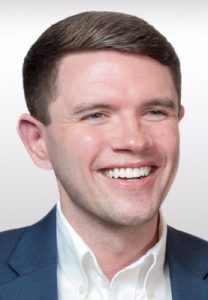
Rep. James Talarico
“This is a fight that’s far from over. We’re happy to celebrate the victories here in Texas at the local level, but we’ve got to do so much more to resist Christian nationalism across the country,” said state Rep. James Talarico, a Democrat who represents Austin.
“Let me be very clear: There is nothing Christian about Christian nationalism. It is the worship of power — political power, social power and economic power in the name of Christ. And it is a betrayal of Jesus of Nazareth,” he said. “Jesus never asked us to ban books, silence teachers or defund schools. Jesus never asked us to control women’s bodies. Jesus never asked us to establish a Christian theocracy. All he asked was that we ‘love thy neighbor.’”
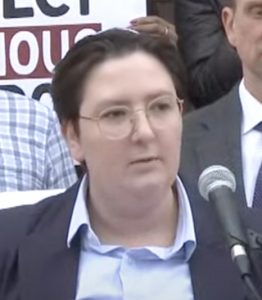
Emily Bourgeois
Religious liberty advocates facing similar bills in other states should look to Texas as an example, said Emily Bourgeois, Texas director for the Religious Action Center of Reform Judaism.
“When we raise our voices as one community of faith here in Texas, we win. Let this be a lesson to all of the states where this battle is still in front of them. When we raise our voices together against the spread of this legislation, we will win. And if we can win in Texas, we can win anywhere.”
For Jewish groups, opposing the school chaplains was a must because it represented an existential threat, Bourgeois said. “We know that the chaplains being brought into schools in this legislation are not reflective of our community. And we know that the backers of this bill rejected protections against attempts to convert our children to Christianity.”
Permitting untrained and unlicensed adults into schools represents a danger to the spiritual well-being of children, said Deborah Reeves, a board-certified chaplain and BJC’s representative at the news conference.
“It also violates the rights of parents and guardians to choose the religious leaders who influence their child’s spiritual journey. A law that allows school districts to create chaplain programs ignores the reality of religious diversity among public school students and assumes a religious role that public schools do not have.”
Reeves was not alone in that perspective. She and more than 170 other chaplains across the state signed a BJC petition protesting the lack of credentials required to work with children under the law. It also emphasized that it is the role of parents, not public schools, to convey religious education and values to children.
“Within my faith tradition, having been through a rigorous certification process and having to maintain board certification with 50 hours of continuing education each year, I am equipped and trained to serve individuals seeking spiritual care without imposing my own faith traditions upon them,” Reeves said.
“As the pastor to children at First Baptist Church of Austin, I care deeply about spiritual discernment and flourishing faith communities. Our houses of worship and other religious institutions are free to serve the needs of families in all spiritual matters.”
Related articles:
100 chaplains urge Texas schools not to take the bait on school ‘chaplains’
Four groups warn Texas schools against new chaplaincy scheme

